Startups developing meat analogs, the next-gen search engine, an adjunct treatment to insulin therapy, a virtual lawyer service, and unique climbing shoes each win CHF 10,000
09.05.2023
Advection Engineering, askEarth, DIATHRIS, Ex Nunc Intelligence, and hooq win Venture Kick's first stage of financial and entrepreneurial support. Their projects develop a technological platform that utilizes hardware tools and a customized pumping sequence program to create desired complex structures and realistic marbling of fat in meat analogs; address the problem of limited access to Earth Observation (EO) information, which is mainly reserved for data scientists; develop a groundbreaking solution to improve Type 1 Diabetes management; revolutionize the way legal professionals work; and create customized climbing shoes based on the unique anatomy and needs of each individual.
 |
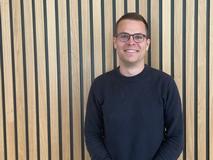 Advection Engineering: Martin Hofman
|
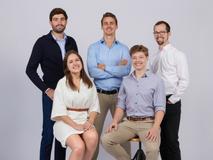 askEarth, from left to right and top down: CSO Gaetan Petit, COO Manuel Gerold, CDO David Berger, CMO Nina Walker, and CTO Simon Gruening
|
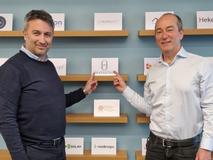 Diatheris' CEO Dr Giorgio Ramadori and CSO Prof Roberto Coppari
|
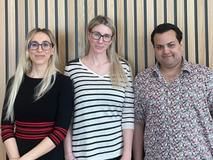 Ex Nunc Intelligence: from left to right, co-founders and co-CEOs Kyriaki Bongard and Zoe Berry, and CTO Laurent Aeschbach
|
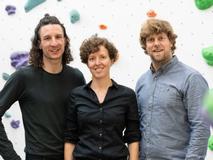 hooq: from left to right, CMO Janick Zumofen, CEO Livia Zumofen, and CTO Beat Müller
|
Advection Engineering: Marbling meat analogs
The demand for reduced meat consumption has led food companies to explore alternatives such as meat analogs. However, while products like patties and sausages are available, analogs of whole cuts like steaks are still missing from the market. This is primarily due to the challenge of replicating the complex structure of muscle fibers and the distinctive marbling of intramuscular fat. Existing approaches, such as additive manufacturing and cultured meat, have limitations in terms of production rate and cost. This creates an opportunity for a solution that can produce realistic, thick, marbled whole-cut meat analogs using plant-based or cell-based ingredients.
The team behind the project, called Advection Engineering, consists of Martin Hofmann, a Pioneer Fellow at ETH Zurich specializing in soft materials, and Prof. Jan Vermant, the head of the soft materials group at ETH Zurich. They have developed a technological platform that utilizes hardware tools and a customized pumping sequence program to create desired complex structures and realistic marbling of fat in meat analogs. Their innovation leverages advective processing, a form of static mixers, to structure protein formulations and distribute fat. This scalable production process is agnostic to the protein source and outperforms existing methods in terms of production rate and thickness. The target market includes food companies interested in selling whole-cut meat analogs, with potential customers already identified. The market for plant-based and cell-based food products is growing globally, and Advection Engineering's technology offers a unique advantage in this expanding sector.
The Venture Kick funds will be used to support the project's development plan and business expansion. The team plans to build and validate demonstrators over the next few months, with the goal of successfully using the equipment at a customer's production facility by the end of the year. The funds will cover the expenses associated with the demonstration campaign, including the production of demonstrators and travel costs. The team expects to bill customers for these demonstrations. Additionally, the funds will be allocated to early hires, such as Yves Schilli, an intern with a background in electrical engineering. As the project progresses, further funds will be utilized to increase exposure to potential customers through publications, participation in fairs, and online presence. Key milestones include the inauguration of a working demonstrator, the confirmed agenda of on-site demonstrations, the successful hiring of key positions like a CTO, and the incorporation of a company in Switzerland. These milestones will contribute to the project's growth and eventual commercialization. advection-e.com
askEarth: the next-generation search engine
DIATHERIS: Adjunct treatment to insulin therapy
Type 1 diabetes (T1D) patients face significant challenges in achieving proper glycemic control without the risk of life-threatening hypoglycemia and ketoacidosis. Despite insulin therapy being the standard treatment, it is suboptimal and fails to meet glycemic targets for most T1D patients, resulting in increased risks of diabetes complications and reduced quality of life. The need to improve T1D management and overcome these limitations is critical.
The team behind the project, Diatheris, consists of Giorgio Ramadori and Prof. Roberto Coppari from the University of Geneva. They are developing a groundbreaking solution to improve T1D management. Their innovation revolves around a small protein called S100A9, which functions as an adjunct treatment to insulin therapy. Through a proprietary approach, Diatheris aims to achieve optimal glycemic control while minimizing the risks of hypoglycemia and ketoacidosis. The project has already demonstrated promising results in preclinical studies with T1D mouse models. With a global market size of over 10 million T1D patients and an estimated annual revenue potential of USD 5 billion, the market for this innovative treatment is substantial. Diatheris plans to enter into a licensing agreement with a strategic partner, preferably a major pharmaceutical company operating in the diabetes space. Several venture enterprises and pharmaceutical companies have expressed interest in the project, indicating its market viability.
The Venture Kick funds will play a crucial role in advancing the project. With an initial funding of CHF 10,000 from Venture Kick - Stage 1, Diatheris plans to validate the regulatory roadmap within nine months. This validation is essential for attracting further investments and completing IND (Investigational New Drug) enabling studies. The funds will be used to support activities such as obtaining external validation for the regulatory strategy, conducting a freedom-to-operate search for intellectual property, and gathering market feedback. The support from Venture Kick will help Diatheris achieve important milestones and progress toward its goal of bringing innovative T1D treatment to the market. diatheris.com
Ex Nunc Intelligence: Your virtual lawyer
The Swiss legal industry has yet to experience technological disruption, resulting in archaic practices and time-consuming tasks. Despite advancements in artificial intelligence, the legal field remains largely untouched. Inefficiencies persist, such as the absence of a comprehensive and up-to-date database of laws and court decisions. This presents an opportunity for innovation to revolutionize the way legal professionals work.
The team behind Ex Nunc Intelligence consists of legal experts and data scientists with multidisciplinary and qualified backgrounds. Co-founders and co-CEOs are Kyriaki Bongard, who holds a Bachelor of Science in Economics, a Master in Law and Economics, a Bachelor of Law, and a Certificate of Advanced Studies in financial regulation, and Zoe Berry, a Tax Specialist with a Bachelor of Science in Economics. Laurent Aeschbach, CTO, is a Senior Data Scientist with a Master of Science in analytics (Georgia Institute of Technology, USA) and a Bachelor in Business Administration. Thomas Seze, the AI Architect, holds a Bachelor of Science in Mathematics, AI and Neurosciences and a Bachelor of Science in Informatics. Remi Zeitoun, the Trainee, is completing a Bachelor in Law at the Geneva University. Ex Nunc Intelligence, a LegalTech startup, aims to transform the Swiss legal ecosystem with its unique and innovative solution. Their product utilizes Natural Language Processing and Deep Learning to tackle these challenges. By offering monthly/annual subscriptions to their virtual lawyer, they provide assistance in various legal tasks, including an up-to-date database of Swiss laws and court decisions, accurate legal answers, and automated drafting of legal opinions. The total addressable market in Switzerland is estimated at 135,191 potential clients, including lawyers, jurists, in-house counsels, compliance departments, and law students, with scalability potential internationally.
Venture Kick funds will be utilized by Ex Nunc Intelligence to implement their hiring plan, focusing on data scientists and NLP specialists. The funds will support the development of their product module by module, testing with Beta users before releasing each module to the market. exnuncintelligence.ch
hooq: Creating unique climbing shoes
The demand for reduced meat consumption has led food companies to explore alternatives such as meat analogs. However, while products like patties and sausages are available, analogs of whole cuts like steaks are still missing from the market. This is primarily due to the challenge of replicating the complex structure of muscle fibers and the distinctive marbling of intramuscular fat. Existing approaches, such as additive manufacturing and cultured meat, have limitations in terms of production rate and cost. This creates an opportunity for a solution that can produce realistic, thick, marbled whole-cut meat analogs using plant-based or cell-based ingredients.
The team behind the project, called Advection Engineering, consists of Martin Hofmann, a Pioneer Fellow at ETH Zurich specializing in soft materials, and Prof. Jan Vermant, the head of the soft materials group at ETH Zurich. They have developed a technological platform that utilizes hardware tools and a customized pumping sequence program to create desired complex structures and realistic marbling of fat in meat analogs. Their innovation leverages advective processing, a form of static mixers, to structure protein formulations and distribute fat. This scalable production process is agnostic to the protein source and outperforms existing methods in terms of production rate and thickness. The target market includes food companies interested in selling whole-cut meat analogs, with potential customers already identified. The market for plant-based and cell-based food products is growing globally, and Advection Engineering's technology offers a unique advantage in this expanding sector.
The Venture Kick funds will be used to support the project's development plan and business expansion. The team plans to build and validate demonstrators over the next few months, with the goal of successfully using the equipment at a customer's production facility by the end of the year. The funds will cover the expenses associated with the demonstration campaign, including the production of demonstrators and travel costs. The team expects to bill customers for these demonstrations. Additionally, the funds will be allocated to early hires, such as Yves Schilli, an intern with a background in electrical engineering. As the project progresses, further funds will be utilized to increase exposure to potential customers through publications, participation in fairs, and online presence. Key milestones include the inauguration of a working demonstrator, the confirmed agenda of on-site demonstrations, the successful hiring of key positions like a CTO, and the incorporation of a company in Switzerland. These milestones will contribute to the project's growth and eventual commercialization. advection-e.com
askEarth: the next-generation search engine
askEarth aims to address the problem of limited access to Earth Observation (EO) information, which is mainly reserved for data scientists. Despite the vast amount of freely available and up-to-date satellite EO images, the insights derived from them are not easily accessible to the public. E0 images are a powerful tool to fight disinformation and provide traceable insight to the wider audience.
askEarth AG was founded in 2023 by a cross-disciplinary team of four members with extensive experience in entrepreneurship and IT projects. The team behind askEarth includes Gaetan Petit, co-founder of Space4Impact, along with Manuel Gerold, Simon Gruening and David Berger. The project leverages the expertise and algorithms from research groups at EPFL, UZH, and ETH, integrating them into an intuitive EO answer engine powered by Large Language Models. The platform utilizes open-source Copernicus satellite data and runs on the Azure cloud computing environment. The EO market was valued at USD 2.8 billion in 2021 and is expected to double in the next 10 years. The market opportunity lies in empowering everyone in a company and will be addressing needs in the agriculture, commodity trading, insurances, energy, real estate, and ESG reporting corporates. In addition, the company aims to build a community of B2C customers by partnering with newspapers. In 2022, the company received the UZH Entrepreneurship Fellowship to work with the UZH Remote Sensing Laboratory. In January 2023, the company was incubated at ETH as part of the ESA BIC, and they launched their answer engine for professional beta testing in April 2023. The Venture Kick funds will be used to further develop their answer engine and expand their customer base. askearth.space
DIATHERIS: Adjunct treatment to insulin therapy
Type 1 diabetes (T1D) patients face significant challenges in achieving proper glycemic control without the risk of life-threatening hypoglycemia and ketoacidosis. Despite insulin therapy being the standard treatment, it is suboptimal and fails to meet glycemic targets for most T1D patients, resulting in increased risks of diabetes complications and reduced quality of life. The need to improve T1D management and overcome these limitations is critical.
The team behind the project, Diatheris, consists of Giorgio Ramadori and Prof. Roberto Coppari from the University of Geneva. They are developing a groundbreaking solution to improve T1D management. Their innovation revolves around a small protein called S100A9, which functions as an adjunct treatment to insulin therapy. Through a proprietary approach, Diatheris aims to achieve optimal glycemic control while minimizing the risks of hypoglycemia and ketoacidosis. The project has already demonstrated promising results in preclinical studies with T1D mouse models. With a global market size of over 10 million T1D patients and an estimated annual revenue potential of USD 5 billion, the market for this innovative treatment is substantial. Diatheris plans to enter into a licensing agreement with a strategic partner, preferably a major pharmaceutical company operating in the diabetes space. Several venture enterprises and pharmaceutical companies have expressed interest in the project, indicating its market viability.
The Venture Kick funds will play a crucial role in advancing the project. With an initial funding of CHF 10,000 from Venture Kick - Stage 1, Diatheris plans to validate the regulatory roadmap within nine months. This validation is essential for attracting further investments and completing IND (Investigational New Drug) enabling studies. The funds will be used to support activities such as obtaining external validation for the regulatory strategy, conducting a freedom-to-operate search for intellectual property, and gathering market feedback. The support from Venture Kick will help Diatheris achieve important milestones and progress toward its goal of bringing innovative T1D treatment to the market. diatheris.com
Ex Nunc Intelligence: Your virtual lawyer
The Swiss legal industry has yet to experience technological disruption, resulting in archaic practices and time-consuming tasks. Despite advancements in artificial intelligence, the legal field remains largely untouched. Inefficiencies persist, such as the absence of a comprehensive and up-to-date database of laws and court decisions. This presents an opportunity for innovation to revolutionize the way legal professionals work.
The team behind Ex Nunc Intelligence consists of legal experts and data scientists with multidisciplinary and qualified backgrounds. Co-founders and co-CEOs are Kyriaki Bongard, who holds a Bachelor of Science in Economics, a Master in Law and Economics, a Bachelor of Law, and a Certificate of Advanced Studies in financial regulation, and Zoe Berry, a Tax Specialist with a Bachelor of Science in Economics. Laurent Aeschbach, CTO, is a Senior Data Scientist with a Master of Science in analytics (Georgia Institute of Technology, USA) and a Bachelor in Business Administration. Thomas Seze, the AI Architect, holds a Bachelor of Science in Mathematics, AI and Neurosciences and a Bachelor of Science in Informatics. Remi Zeitoun, the Trainee, is completing a Bachelor in Law at the Geneva University. Ex Nunc Intelligence, a LegalTech startup, aims to transform the Swiss legal ecosystem with its unique and innovative solution. Their product utilizes Natural Language Processing and Deep Learning to tackle these challenges. By offering monthly/annual subscriptions to their virtual lawyer, they provide assistance in various legal tasks, including an up-to-date database of Swiss laws and court decisions, accurate legal answers, and automated drafting of legal opinions. The total addressable market in Switzerland is estimated at 135,191 potential clients, including lawyers, jurists, in-house counsels, compliance departments, and law students, with scalability potential internationally.
Venture Kick funds will be utilized by Ex Nunc Intelligence to implement their hiring plan, focusing on data scientists and NLP specialists. The funds will support the development of their product module by module, testing with Beta users before releasing each module to the market. exnuncintelligence.ch
hooq: Creating unique climbing shoes
hooq aims to enable the unique climbing experience for everyone. The problem addressed by hooq is the discomfort and potential long-term damage caused by ill-fitting climbing shoes. Traditional climbing shoes are very tight and come in limited standard shapes, leading to pain and strain on tendons, ligaments, and joints. This restricts climbers' performance and enjoyment of the sport, particularly for those with unique foot shapes. The lack of viable solutions for climbers with special feet creates a significant pain point and hampers their ability to pursue their passion.
The hooq team, incubated at ZHAW Runway Startup Incubator and ZHdK Z-Kubator, consists of passionate climbers and experienced professionals, including Livia Zumofen as CEO, Beat Müller as CTO, and Janick Zumofen as CMO. They have developed a digital shoe-shaping process utilizing cutting-edge technologies such as 3D scanning, automated design algorithms, and additive manufacturing. This innovative approach allows hooq to create customized climbing shoes based on the unique anatomy and needs of each individual, providing a perfect fit and improved performance. The initial focus is on the B2C market, catering to climbers, especially those with special feet. The climbing shoe market is substantial, with a size of about 40 million CHF in Switzerland and over CHF 4 billion worldwide, growing at a rate of 15-20% annually.
The Venture Kick funds will be instrumental in furthering hooq’s progress. The financing will primarily be used for the production of prototypes to showcase the benefits for customers with special feet and the beta series for testing and optimizing the shoe shapes for the minimal viable product (MVP). The knowledge gained from the beta series will be crucial in finalizing the shoe shaping process for market entry. The milestones for 2023 include founding hooq AG, developing shoe shapes for the MVP, producing and testing prototypes, and launching a crowdfunding campaign for market entry. hooq.ch


